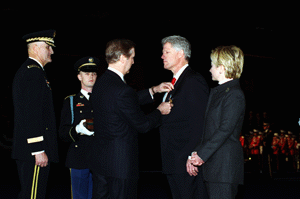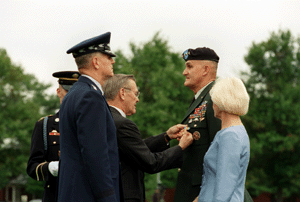A hidden problem in the US military is the corruption of the awards process. Napoleon discovered that "little bits of ribbon"
motivated his men to fight. Unfortunately, the motivation medals inspire among
US military officers is harmful. Commissioned officers have the "special trust and confidence" of the
Commander-in-Chief. This is why they rate higher pay, better quarters, and special privileges. Therefore, it is difficult to justify awards
to officers for performing duties to the best of their ability. The value of medals for promotion causes petty competition among officers and may allow unqualified officers to advance. A Medal of Honor
may allow a brave lieutenant to advance to the rank of colonel despite incompetence, with disastrous results.
Prior to World War II, many career officers never received a single medal, and some officers viewed individual awards for commissioned officers as inappropriate. Even during the years of heavy fighting of World War II, medals were awarded sparingly.
Nevertheless, there are numerous accounts of medal abuse from that war. In
his book, Foot Soldier, Roscoe Blunt wrote: "For the first time in a
long time, I felt a little like a hero, but medals were normally reserved for
officers who spent much of their time finding ways to write up citations for
each other."
Post-war demobilization led to intense competition for retention in the active force. Officers quickly learned the value of awards and began to "work the system" to get their
tickets punched.
This inflation of awards exploded during the Korean War where it became routine for officers to earn numerous awards for just doing their job. Some rear-echelon officers would visit the front and write each other valor awards for the trip. This led to disillusionment among enlisted men, who suspected that some aggressive attacks were planned to justify awards for their officers.
Read the book "About Face" by Colonel David Hackworth for numerous
examples, and
here are some recent "Medalgate" stories from Hackworth in
2003.
Award scandals became common during the next four decades. Although
just one general officer was killed in direct
combat during the entire Vietnam war, they awarded each other hundreds of medals for valor. After the
1983 Grenada invasion, the Army awarded more medals than the total number of soldiers who landed on the island. During the Persian Gulf war, the Navy awarded the
Combat Action Ribbon to every sailor aboard ship near Kuwait, while every GI ashore earned a row of ribbons.
Three soldiers who got lost in Kosovo and were taken prisoner for a couple of
months each received six awards. The corruption reached a new low during the last year of the Clinton
administration when the Secretary of Defense awarded a medal to the President
and his wife.
Today, the awards system is an embarrassment for most American servicemen. End-of-tour and
retirement awards are common, with the recipient often required to write his own citation. Many units have quotas for awards they must give out, and headquarters personnel are most likely to be decorated. Officers are more likely to receive awards, especially higher awards. As a result, senior American military officers with no combat experience wear a chest full of medals. This invites ridicule from foreign officers and civilians who secretly mock the
"Christmas tree" look, similar to that of pompous
dictators.
This also produces an enormous paperwork burden.
The awards process must be fixed, and the first step is to ban individual awards for commissioned officers. They could still wear campaign and unit awards, while extraordinary heroism or achievement would still be reflected in performance evaluations. Without the distraction of securing credit for themselves, officers
can focus on recognition for enlisted men.
If this idea proves too radical, at least ban awards to flag officers. Awarding
medals to Generals and Admirals is normally a result of politics or skewed
traditions which undermines overall morale.
The first step is for Congress or the President to
establish a Military Awards Review Commission (MARC). This
would consist of a retired officer from each service and several civilians to
evaluate the massive growth in military awards and the resulting confusion.
Like the Base Closure commission, the President and Congress must accept
or reject the entire list of recommendations by the MARC. Otherwise,
Generals, Admirals, and every Congressman and staffer will demand their personal
ideas be adopted, and the process will stalemate.
The MARC could look at many issues. For example, are seven levels of awards for non-combat achievements needed? Can some awards be combined, like Army, Navy, Air Force, and Joint Achievement Medals could simply become the “Military Achievement Medal”. Is a NATO ribbon and a UN ribbon required in addition to an overseas service ribbon or campaign/expedition ribbons? Can the “combat V device” be eliminated by limiting certain awards, like a Bronze Star for valor and a Commendation Medal for non-combat? How can Service secretaries be prevented from tossing out awards like candy after conflicts. Do most POWs, who did nothing more than surrender, deserve a medal? Do all servicemen deserve the National Defense Ribbon for breathing during a conflict?
Much confusion can be eliminated by adopting a single system for all the Armed Services. This eliminates the problems for servicemen who transfer to a different service or paperwork snafus in Joint commands. These are just some of the topics which need to be addressed. There is no doubt the military awards system has become corrupted, confusing, and burdensome. A MARC is needed to settle these issues.
Carlton Meyer editorG2mil@Gmail.com
©2006 www.G2mil.com